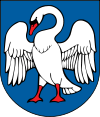Jonava
| Jonava | |||
|---|---|---|---|
| City | |||
 |
|||
|
|||
| Nickname(s): Jonų ir Janinų sostinė (The capital of Jonai and Janinos) |
|||
| Location of Jonava | |||
| Coordinates: 55°4′20″N 24°16′50″E / 55.07222°N 24.28056°ECoordinates: 55°4′20″N 24°16′50″E / 55.07222°N 24.28056°E | |||
| Country |
|
||
| Ethnographic region | Aukštaitija | ||
| County |
|
||
| Municipality | Jonava district municipality | ||
| Eldership | Jonava town eldership | ||
| Capital of | Jonava district municipality Jonava town eldership |
||
| First mentioned | 1740 | ||
| Granted city rights | 1864 | ||
| Area | |||
| • Total | 13.6682 km2 (5.2773 sq mi) | ||
| Population (2015) | |||
| • Total | 29,031 (9th) | ||
| Time zone | EET (UTC+2) | ||
| • Summer (DST) | EEST (UTC+3) | ||
| Website | http://www.jonava.lt | ||
Jonava (![]() pronunciation , Polish: Janów, German: Janau) is the ninth largest city in Lithuania with a population of ca 30,000. It is located in Kaunas County in central Lithuania, 30 km (19 mi) north east of Kaunas, the second-largest city in Lithuania. It is served by Kaunas International Airport. Achema, the largest fertilizer factory in the Baltic states, is located nearby. The city is sometimes called "the capital of midsummer holiday" (lt. – Joninės).
pronunciation , Polish: Janów, German: Janau) is the ninth largest city in Lithuania with a population of ca 30,000. It is located in Kaunas County in central Lithuania, 30 km (19 mi) north east of Kaunas, the second-largest city in Lithuania. It is served by Kaunas International Airport. Achema, the largest fertilizer factory in the Baltic states, is located nearby. The city is sometimes called "the capital of midsummer holiday" (lt. – Joninės).
Jonava was officially established as a city in the 18th century during the times of the Polish-Lithuanian Commonwealth. In 1750 first wooden church has been built in Jonava. In 1778 beer brewery was operating in the town. Around 1812 Napoleon and his army invaded the town and it's surrounding villages. In 1923 Jonava officially recognised as city-status settlement and in 1950 it become centre of municipality.
The city had a large Jewish population before World War II - in 1893 92% of the population was Jewish and in 1941 it was 80%. In 1932 there were 250 shops owned by Jewish families, a Jewish bank, 7 synagogues and a Jewish school. During World War II Jonava was attacked by Nazi Germany. A Christian church and five Jewish synagogues were destroyed. The Jews of the city were killed in two massacres, in August and September 1941. A total of 2,108 people were executed by an Einsatzgruppen of Germans and Lithuanians collaborators. 200 remaining Jews were kept prisoners at the Kaunas ghetto.
...
Wikipedia



